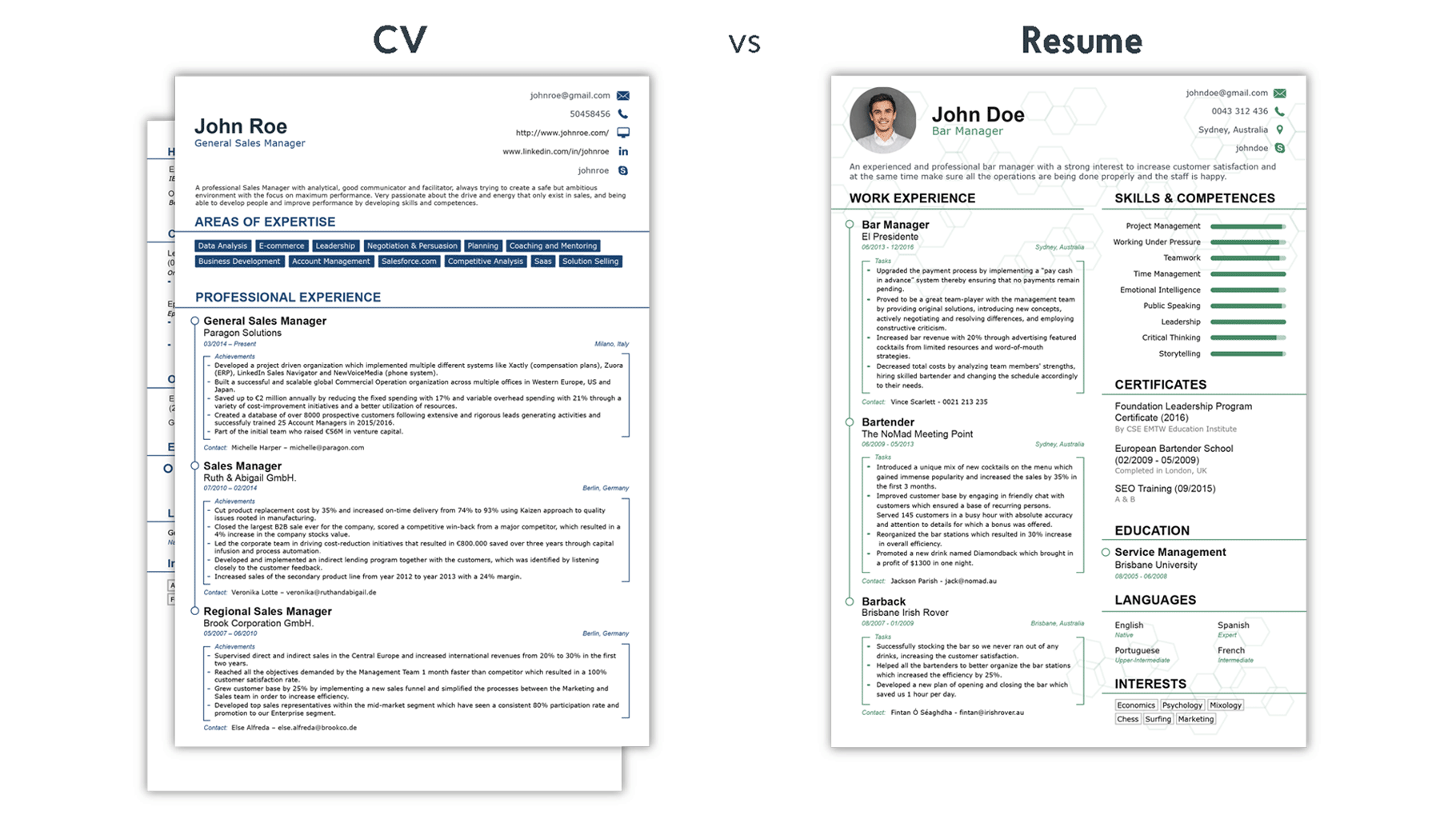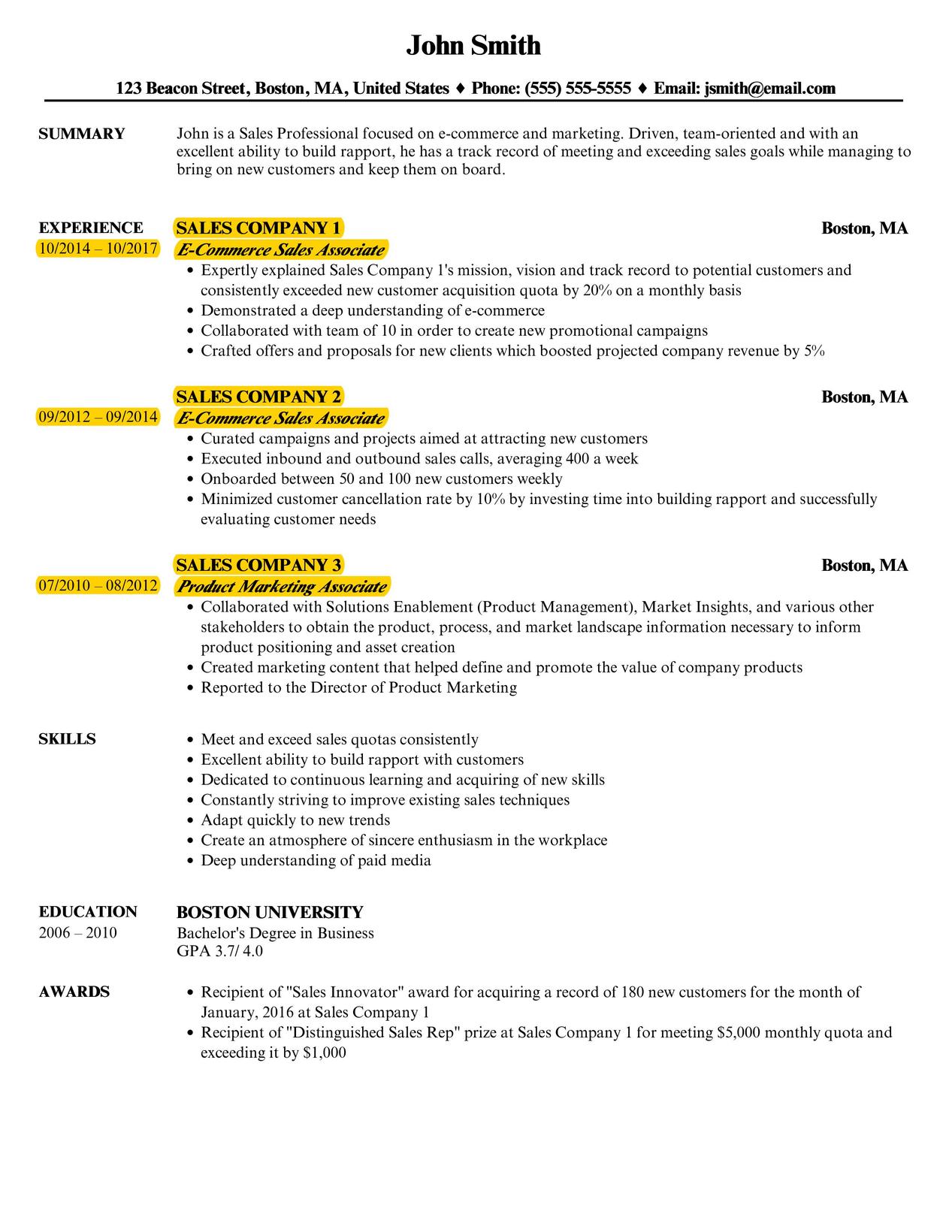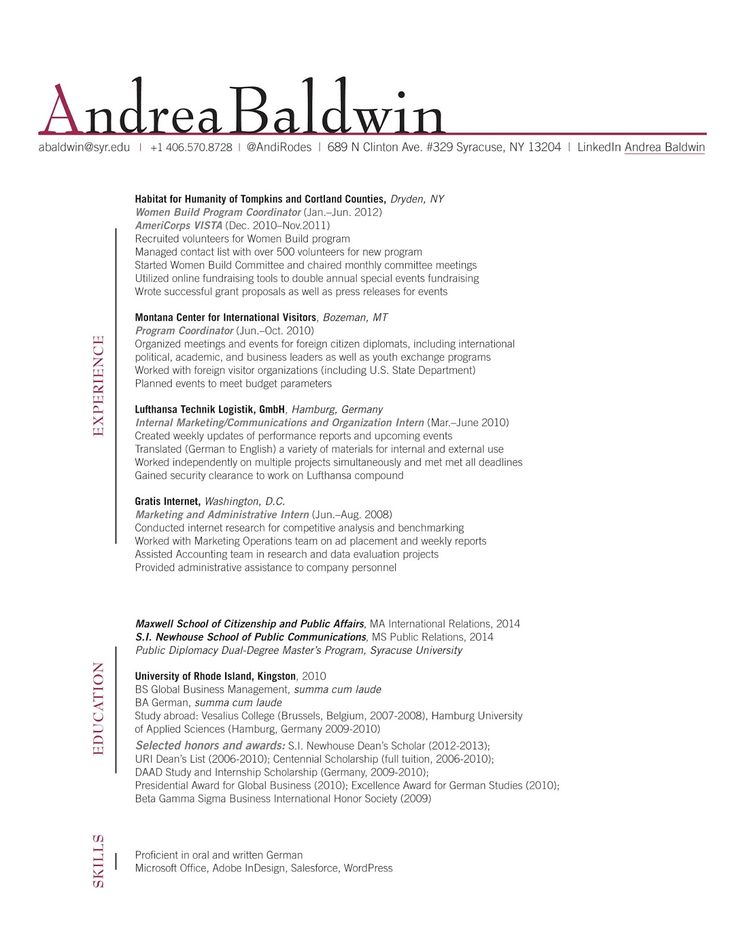Infographic Video And Website Rsums
As the Internet becomes more driven by multimedia, job-seekers have sought to take advantage of the trend by moving their résumés away from the traditional paper and email media to website résumés or e-résumés.
Video, infographic, and even Vine résumés have gained popularity recently, though mainly in the creative and media industries.
This trend has attracted criticism from human resources management professionals, who warn that this may be a passing fad and point out that multimedia-based résumés may be overlooked by recruiters whose workflow is designed only to accommodate a traditional résumé format.
How To Format A Curriculum Vitae
The following are some of the rules that you should follow when formatting your curriculum vitae:
1. Length
The CV should not be too long and not too short. The length of the CV depends on the education and working experience you have amassed over the years. For entry-level positions, the CV length can be one to two pages, while the length can go up to 10 pages for positions that require higher qualifications and more experienced personnel.
2. Font size
When writing a curriculum vitae, use a font that is easy to read and apply it to the whole document. The recommended font styles include Arial, Calibri, Cambria and Times New Roman. The font size should be between 10 to 12 points. The headings should be boldened to distinguish them from the other information and make the CV organized.
3. Proper grammar and spelling
Sending a CV that has spelling, tense, or grammar errors would only serve to spoil your chances of getting shortlisted for an interview. Before sending the CV to your prospective employer, make sure to check it several times to correct any errors. Alternatively, ask a friend to review the CV for any errors.
When Do I Need A Cv
Some graduate school applications may request a CV, but they may request your resume. Read the requirements carefully.
To further complicate matters, differently formatted CVs function as resumes for many international positions. Thats why CV and resume are often incorrectly used interchangeably!
International CVs may require more personal information than American ones, for example, but the preferred format may vary per job location.
Educate yourself on the countrys culture and expectations before completing your CV and applying a recruiter may be able to advise you more specifically.
If youre in business, engineering, nonprofits, the arts, or any other non-academic field in the U.S., stick with a standard 1-2 page resume. You might still include brief mentions of your publications, certifications, or presentations, but only prioritize whats relevant for the job.
A resume is shorter, but it does the trick. Its designed to just give a brief overview that will land you an interview, where you can go more in-depth. With your relevant job experience laid before the eyes of the hiring manager, ATS- friendly and typo-free, youll be on the road to success.
Need to cut your CV down to a concise resume? Schedule a free call with us to find out how our professional writers can rework your resume, cover letter, and LinkedIn profile to land you that dream job.
Categories
Don’t Miss: What Your Resume Should Look Like In 2020
Difference Between A Cv And Resume
Empowering People To Change Their Lives.
These days its pretty common for people to look for jobs abroad. Even if you havent done so yourself, you probably know that standards for job applications in one country dont necessarily apply elsewhere. The most glaring example of the cross-border difference in job application procedures is the use of a resume vs Curriculum Vitae . Chances are good that youve heard of both, but you are probably used to dealing with only one or the other.
Knowing the difference between a curriculum vitae and resume can be valuable to your job search. It will prepare you for a situation where you are asked to provide either when applying for jobs both at home and abroad.This article will cover all the information you should know about resumes and CVs, including how, when and where to craft a CV vs a professional resume.
Where Is The Company Based

Depending on where the company is located, CV may refer to a standard resume or it may refer to the longer form, highly detailed document explained above. To determine which you should send, first consider the type of job. If its an academic or research position, the employer is likely seeking a traditional CV. If its any other type of job, including a role with a business or even a staff position within academia, then the employer is likely seeking the shorter form resume-style document.
If youre in doubt about whether you should send a CV or resume, reach out to the recruiter or hiring manager and ask for clarification.
If you have a resume but not a CV , it may be worthwhile to put one together. A CV is, in many ways, a more detailed version of a resume with a few additional pieces of information, so creating one from the other shouldnt require a great deal of work. Having the right document for a job application is crucial, and keeping both options on hand will ensure youre prepared no matter what the job posting requests.
Related:
Don’t Miss: Microsoft Office 2010 Resume Template
How To Write A One
What Does Resume Mean
Resume is a verb that means to continue or to take up or go on with again after interruption. You can resume watching your favorite TV show after dinner, for example, or you could say that the football game resumed after the storm passed.
The noun form of resume is resumption, which is the act or fact of taking up or going on with again. The resumption of activities in nicer weather, for instance.
Resume was first recorded in 13751425. It comes from the Latin resmere. The Latin word can be broken down into re-, a prefix meaning again, back, and smere, which means to take.
The definition is pretty straightforward, but it can get a little more complicated very fast. Resume is also a spelling variant of résumé when the accent marks are dropped . You can thank how the English language adopts some French words for that curveball.
Also Check: How To Put Bilingual In Resume
Why Resumes Are Important For Job Seekers
Your resume, along with a cover letter, is an essential part of the hiring process, and is a base requirement to be considered for a position.
A good resume is the first part of your application any hiring manager will see, so its important that it conveys your qualifications accurately and convincingly.
Your resume should offer employers a digestible overview of your relevant skills, employment history, education background, and accomplishments. Based on this information, they can make an informed decision about whether or not they want to interview or hire you.
But writing a resume from scratch can be time-consuming. To simplify the process, try using our online resume builder. Just type in your information and our software will help you assemble a perfectly formatted resume that is sure to impress any hiring manager.
Do Recruiters Prefer Resumes Or Cvs
In North America, resumes are the go-to document for evaluating candidates in most jobs. CVs are usually only required for positions where more detail about your qualifications and work history is needed, such as for academic and research roles, or highly technical jobs.
Quebec is an exception. In Quebec, the terms âresumeâ and âCVâ are used interchangeably, though recruiters are most likely looking for a document more along the lines of a resume.
Outside of North America, CVs are much more common. If youâre applying to international jobs in Europe or the Middle East, you may want to consider having a CV.
You May Like: How Many Years On A Resume
Know The Differences Between A Resume And Cv
A resume is a short document of career highlights customized for each new job application. A CV is a long, in-depth breakdown of all your work, education, achievements, and projects within a specific field.
The difference is demonstrated by the word origins: The French résumé can be translated as summary while the Latin curriculum vitae means course of life. Technical differences between a resume and a CV include document length, formatting, focus, and the frequency of updates.
Curriculum Vitae Vs Resume: Format And Content
The CV presents a full history of your academic credentials, so the length of the document is variable. In contrast, a resume presents a concise picture of your skills and qualifications for a specific position, so length tends to be shorter and dictated by years of experience .
CVs are used by individuals seeking fellowships, grants, postdoctoral positions, and teaching/research positions in postsecondary institutions or high-level research positions in industry. Graduate school applications typically request a CV, but in general are looking for a resume that includes any publications and descriptions of research projects.
In many European countries, CV is used to describe all job application documents, including a resume. In the United States and Canada, CV and resume are sometimes used interchangeably. If you are not sure which kind of document to submit, it is best to ask for clarification.
Recommended Reading: What To Write In Email With Resume
Less Is Not More With A Cv
While you do not want to bury a prospective employer in an avalanche of information about yourself, a CV is often at least five to ten pages in length. If you are a senior practitioner in your field, your Curriculum Vitae may well extend to 20 pages and beyond. This is so that you can list how extensively you have been published and include your many speaking engagements of a professional nature. Over time these things add up.
The overall impression that you want to get across is that your achievements are so vast, that your work history and/or credentials are so far-reaching, that you come off looking rock solid as a candidate for the positions you will be applying to.
Make certain that you read any instructions provided by employers in their job postings. When it comes to CVs, some employers are very specific about what they want you to include and how the information should be laid out. Follow the instructions then submit a stellar CV when appropriate and your next job may be closer than you think.
Why Is Rsum Spelled That Way

Sometimes when the English language adopts a word from another language, the accent marks stick. Consider the word café, or déjà vu. The accent marks tell French speakers how to pronounce a vowel. That mark over the E in résumé is called an acute accent and signals that it should be pronounced like ey. Accent marks also distinguish two different words that are otherwise homographs.
That latter reason is one example of why the accent marks remain in English. A reader would have to rely entirely on context if résumé lacked the accent marks, and relying on context can easily lead to a misreading of the situation.
That said, sometimes the markings are left out in common usage, especially for words that were borrowed from French long agothey had time to settle in, drop the marks, and assimilate. Thats why, in informal writing, résumé may be spelled resume. Think of it like how some places describe themselves as a café while others use cafe.
As with anything else in communication, its important to know your audience. Résumés are typically used when applying for a job or school. Both of those tend toward more formal, so using résumé with the acute accents is a safe bet.
Read Also: Sponsorship Resume Template
Detail Your Academic History In Reverse
This can include your post-doctoral programs, graduate school, undergraduate school and high school. Only include your most recent two educational experiences. Dates attended is only recommended if youve graduated in the past five years. Employers are more interested in your professional experience, so it’s best to ensure the readers focus is on that information.
Should I Have A Cv Handy
If you dont currently have one, Id recommend creating the doc just in case. You dont have to stop everything youre doing right this second, but the next time you go to modify your resume , start building it out. If nothing else, itll serve a dual-purpose: Not only can you have it handy if you do ever need it, but youll also have a running list of everything youve ever accomplished, a.k.a., a master resume to pull from as you tailor your own for specific positions.
And there you go, everything you ever wanted to know about the differences between a CV and a resume.
You May Like: How Many References Do I Need On A Resume
Examples Of Resume In A Sentence
resumedresumedresumedresumedresumedresumingrésumérésumérésuméresume Fox Newsresume Varietyresume Anchorage Daily Newsresume San Francisco Chronicleresume The Arizona Republicresume Milwaukee Journal Sentinelresume baltimoresun.comresumeThe Salt Lake Tribuneresume clevelandresume The Arizona RepublicresumeThe Indianapolis StarresumeUSA TODAYresumeSan Diego Union-Tribuneresume alresume CNNresume The Salt Lake Tribune
These example sentences are selected automatically from various online news sources to reflect current usage of the word ‘resume.’ Views expressed in the examples do not represent the opinion of Merriam-Webster or its editors. Send us feedback.
What To Include In Your Curriculum Vitae
Your curriculum vitae should include your name, contact information, education, skills, and experience.
In addition to the basics, a CV includes research and teaching experience, publications, grants and fellowships, professional associations and licenses, awards, and other information relevant to the position you are applying for.
Start by making a list of all your background information, and then organize it into categories.
Don’t Miss: Academic Project Resume
The Difference Between Us And International Cvs
The primary difference between a U.S. resume and an international CV is that employers in other countries, unfettered by U.S. employment discrimination laws, require more personal information than one would provide on a resume in the United States
These details vary by country, but can include ones date of birth, nationality, marital status, and number of children. Heres how to structure your international curriculum vitae.
Cv Vs Resume: Key Differences And When To Use Which
Whether you’re in school or looking to get a new job, you need the right job application documents. If you haven’t already, you should compare a CV vs. a resume. While both can be useful, you may need one over the other.
What is a CV or resume? Both are documents that cover your education and work experience. Using one can help you get a job in your field or obtain a higher degree.
Read on to learn the differences between them and which one you should use.
Don’t Miss: Leadership Skills On Resume
List Honors And Awards
Use this section to outline your achievements in the field related to your application. Start with the award name followed by the year it was awarded, the organization that gave you the award and details about the award such as how often the award is given, how many people receive it, etc.
For example:
UT Teaching Awards, 2018, 2019, 2020Brazil Study Abroad Grant, Summer 2017Dissertation Fellowship, 2016
How To Write A Successful Cv

- Know what to include and how to format the information. These sample CVs provide a helpful guide this piece offers tips for writing your very first CV.
- Choose an appropriate format. Make sure you choose a curriculum vitae format that is appropriate for the position you are applying for. If you are applying for a fellowship, for example, you won’t need to include the personal information that may be included in an international CV.
Recommended Reading: Emailing Resume Template
Whats The Correct Resume Spelling
Both résumé and resume are correct, although the latter is becoming more popular lately.
Focuses on education and academic achievements
Focuses on relevant work experience and skills
Used in academia to apply for fellowships, grants, or graduate programs
Used to apply for all non-academic jobs
Detailed and elaborate: a comprehensive outline of your career
Brief and relevant: its purpose is to show youre a good fit for a particular job
No bullet points, only plain paragraphs
Skills and professional experience outlined in bullet points
What about other countries then?
International Cv Versus A Us Cv
As youve learned, in the US, a CV and resume are different documents. However, in many other countries, the words CV and resume are used interchangeably.
For example, in most European countries, the UK, and Asia, CVs are used in all contexts the word resume is rarely used in these regions.
Have a look at CV templates on Monsters UK site and Monsters German site and compare them to U.S. resume templatesthey more or less provide the same types of information. So if a British employer asks for a CV and you, the American, send your resume, youre giving them what theyre expecting to see.
That said, dont take chances. If youre applying to work outside of the US, its worth clarifying exactly what document the hiring employer prefers.
Also Check: How To Write A Resume For A Scholarship